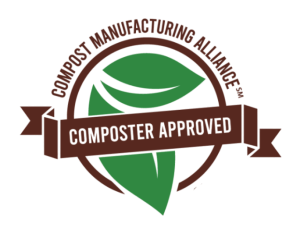By Kari Rolnick
CMA strives to be the highest standard in compostable product testing in North America. When a product attains CMA certification, it has been evaluated from multiple perspectives:
1) Is it a product that is related to food or yard waste?
2) Is there a means of collecting the product for proper disposal?
3) Does the product pose a risk of increasing contamination through “come-along” products?
4) Does the product pass laboratory standards for compostability?
5) Will the product disintegrate in real-world composting operations?
CMA certification is a multi-pronged validation to ensure compost manufacturing remains sustainable by reducing contamination of composting feedstocks and engaging manufacturers in mutually beneficial working relationships. At the heart of CMA’s certification is our field-testing program. We utilize a variety of compost technologies to test and ensure products intended be composted actually break down into compost. Alongside the field test, CMA requires that all products pass the applicable laboratory standard. In addition to applicable ASTM testing, products must also demonstrate total fluorine (TF) at <100 ppm, per CMA-specific protocols.
CMA certifies to ASTM standards D6400 and D6868, specifications for products designed to be aerobically composted in industrial facilities. Any product that passes our field test must also demonstrate passing ASTM test results to qualify for CMA certification. The applicable ASTM tests will vary, depending on the product category, but in general this testing suite includes: whole product disintegration, biodegradation, heavy metals, plant toxicity, FTIR analysis & Percent Ash. Any organic additives in excess of 1% dry weight percentage or substrate coatings must also demonstrate biodegradation on their own merit. For more information on product-specific requirements or specific test methods, please consult with a CMA-approved ASTM testing laboratories at https://compostmanufacturingalliance.com/labs/.
For some product categories, ASTM specifications are analogous to alternative certification test specifications. However, that is not always true. While we can accept lab results that test to an alternate specification in some cases, these documents always require review by CMA. The CMA profile form and detailed product constituency is also required for this review, in order to determine if the testing performed included all required elements. Any time the manufacturing conditions of a product change or if the product itself changes, new ASTM testing is required. Updated ASTM testing is required every five years in order to ensure updated standards and test methods are met.
Finally, total fluorine (TF) testing is required for any CMA certified product. In conjunction with new legislation, CMA is working to ensure no products we certify contain PFAS chemicals. Our goal is to encourage product manufacturers to develop new products that are PFAS free. We have developed a specific and robust protocol for testing TF in compostable packaging. Since there is no feasible, direct test for the plethora of PFAS and PFOS in the wide range of products we certify, we have found the best solution is to test for total fluorine per our protocols. Please contact our approved TF labs for more information.
Through appropriate lab testing and field testing, CMA is connecting compost manufacturers and compostable product manufacturers. We ensure compost feedstocks are healthy, sustainable, and productive for compost manufacturers by validating food product packaging meets rigorous laboratory and field compost standards. For any questions related to laboratory prerequisites, please contact Kari Rolnick, Compliance Supervisor, at kari.rolnick@composterapproved.com.

